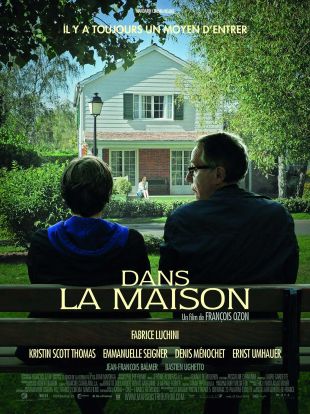
A clever little conceit that deftly blossoms into a mind-blowing exploration of art, voyeurism, life, the universe, and everything, French director François Ozon's 2012 film In the House is so intensely watchable, you might not notice its genius until the very end. Ozon's similarly crafted 2003 thriller Swimming Pool was an art-house hit in the U.S. for the same reasons, but while that movie opted to explicitly reveal that the things we were seeing in the narrative might just be the character's imaginings through ever more literal twists and revelations, In the House is far more cunningly subtle, and ultimately more fascinating.
The story opens with high-school literature teacher Mr. Germain (Fabrice Luchini). A one-time writer who failed to develop as an author, the now middle-aged Germain attempts, with increasing cynicism, to inspire an appreciation for great prose in his teenage students, while his wife Jeanne (Kristin Scott Thomas) runs a small art gallery. A new school year has just begun, and Germain is sifting through a pile of uninspired, monosyllabic essays about his students' weekends when he comes across one that catches his eye. In his paper, pupil Claude Garcia (Ernst Umhauer) describes manipulating his way into a friendship with sweet, guileless classmate Rapha Artole (Bastien Ughetto) by offering to tutor him in math. A poor kid from a broken home, Claude then reveals that he's often watched Rapha's perfect suburban family interact in their perfect suburban house from the park across the street, and has long dreamed of infiltrating their picturesque life -- for reasons we don't yet know, but can assume are not virtuous.

Slightly disturbing but undeniably well-written, Claude's essay inspires Germain to begin meeting with Claude after class. With every new writing assignment, Claude continues the ongoing story of his contrived friendship with Rapha, which includes copious snooping through Rapha's well-kept home and biting observations about his artless, middle-class parents. Claude plainly states that this strange experiment is real, and that he bases his essays on his own actual experiences -- which makes it even more interesting when Germain critiques his student's writing, pointing out that even when Claude describes events as they truly happened, they can nonetheless appear to the reader as hackneyed and unrealistic. And so Claude's exploits are reenacted for us in different ways, as he takes Germain's suggestions and rewrites his descriptions of them.
But do we, as the viewer, know that even the original versions of Claude's stories do indeed depict how things really transpired? Can Claude be trusted as a narrator, or is there really no such thing as an unbiased account? What's truly impressive about In the House is that it never has to ask these questions directly -- it gets you to ask them instead. There's no heavy-handed symbolism, and even though the story onscreen may very well, at any point, be diverging from reality and turning into a character's imaginings, these shifts are imperceptible -- at least when the film isn't playfully inserting Germain directly into a scene with Claude and the Artoles, so he can critique his student's choices as a narrator.
But despite the movie being so clever and graceful when it comes to portraying the subjective nature of any story, don't be surprised if it inspires you to ask a number of existential questions long after the credits have rolled. If Claude only embeds himself in Rapha's life so he can write about it later, does that make his work more contrived than that of the average writer, or less so? Could the same question be posed about his whole life? Or any artist's life? Should authorship of these essays include Germain as well, due to his extensive involvement? And if so, does that mean Rapha also deserves credit? What about Rapha's whole family? Where does inspiration end and authorship begin? Instead of setting up characters and events like cardboard stand-ins for this subtext, Ozon instead weaves meaning upon reflected meaning on a serpentine path through the film, taking you on an enraptured ride that's fun while it lasts, and even more captivating after it's over.
